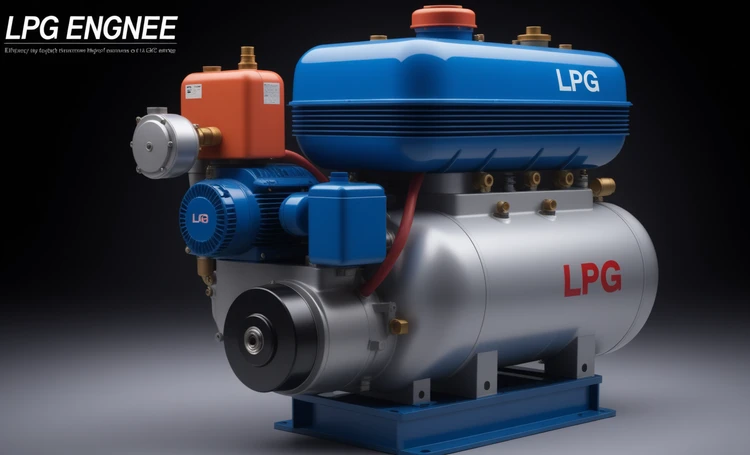🌍 Comparison of Engines: Advantages of Liquefied Gas Engines
In recent years, the automotive industry has been actively researching and introducing alternative fuels to reduce the harmful impact on the environment. One of the promising areas is the use of liquefied gas as fuel for engines. To learn more about the benefits of LPG engines, find out more here. In this article we will look at the main advantages of liquefied gas engines compared to traditional gasoline and diesel engines.
🛢️ Comparison with Traditional Engines
Liquefied gas (LPG) is a mixture of propane and butane, which is in a liquid state under high pressure conditions. This allows it to be used as fuel for internal combustion engines. Compared to traditional gasoline or diesel engines, liquefied gas engines have a number of advantages:
🌿 Eco-friendly
- Reduced emissions: LPG engines produce fewer harmful emissions, including nitrogen oxides and carbon oxides, making them a greener choice.
- Less air pollution: Reduced emissions help improve air quality in the city.
💵 Savings
- Fuel cost: LPG is usually cheaper than gasoline and diesel, which helps reduce fuel costs.
- Fuel efficiency: LPG engines often have higher efficiency, which increases mileage per fill-up.
🔧Service
- Durability: LPG engines generally have a longer life due to less wear on parts.
- Reduced repair costs: The clean combustion of liquefied gas reduces the formation of soot and deposits in the engine.
🌐 World Trends and Politics
In different countries of the world, including Germany, the USA and other European countries, work is actively underway to introduce and promote the use of liquefied gas engines. The governments of these countries are taking various measures to stimulate the transition to environmentally friendly modes of transport, including cars with liquefied gas engines.
🇩🇪 Germany
In Germany, there are various programs for subsidies and tax breaks for the owner of a car running on liquefied gas. This contributes to the growing popularity of such cars among the population.
🇺🇸 United States
In the USA there is also a trend towards an increase in the number of cars running on liquefied gas. The government is introducing various incentive programs, including tax incentives and grants for infrastructure development.
🇪🇺 European Union
The countries of the European Union are actively developing environmental initiatives, including supporting the use of liquefied gas in transport. This includes investing in fuel station infrastructure and providing tax incentives to encourage a shift to greener modes of transport.
💼 Economic and Environmental Aspects
The use of liquefied gas as a fuel has not only environmental but also economic benefits. First, it reduces dependence on oil and reduces the impact of oil price fluctuations on the economy. Secondly, it contributes to the development of new technologies and the creation of jobs in the field of alternative energy.
🌱 Sustainable Development
The transition to liquefied natural gas vehicles helps achieve global goals to reduce greenhouse gas emissions and combat climate change. This is an important step towards sustainable development and the transition to a green economy.
💡 Technological Innovation
Advances in LPG engine technology are opening up new opportunities for the automotive industry. Innovative solutions are improving the efficiency and performance of these engines, making them competitive with traditional engines.
📊 Statistics and Forecasts
Analytical data shows that the market for liquefied gas vehicles will continue to grow. It is expected that by 2030 the share of such vehicles in the total vehicle fleet will increase significantly, especially in countries with active environmental policies.
📈 Market Growth
- Increasing Demand: Given the environmental and economic benefits, the demand for LPG vehicles continues to grow.
- Infrastructure development: In parallel with the increase in the number of liquefied gas vehicles, the infrastructure of gas stations is also improving.
🌍 Global Impact
This trend is of global importance, as it helps reduce overall carbon dioxide emissions and improve the environmental situation in the world.
🚗 Benefits for Users
There are several key advantages for drivers of LPG vehicles:
- Reduced fuel costs: Thanks to the lower cost of liquefied gas compared to gasoline or diesel, drivers can save significantly on refueling their car.
- Environmental awareness: Using cleaner fuel reduces the user's environmental footprint, helping to preserve the environment.
🛠️ Technical Aspects
Modern LPG engines are designed to provide maximum efficiency and reliability:
- High performance: Modern LPG engines can provide the same and sometimes more power than their petrol and diesel counterparts.
- Reliability and safety: Technologies for the production and installation of liquefied gas systems meet high safety standards.
📝Importance of Information and Education
To spread the use of liquefied gas vehicles, it is important to educate the public about their benefits and safety. Educational campaigns and awareness programs can help increase consumer awareness of these technologies.
🌏 Global Community
Helping the global community understand and accept clean technologies is key to combating climate change. The development of a network of filling stations and improving the availability of liquefied gas vehicles play an important role in this process.
🌟 Development Prospects
The future of CNG vehicles looks promising given the current trends and advancements in technology. Growing awareness of environmental issues and the desire to reduce carbon emissions are driving increased interest in this mode of transport.
📈 Market Development
Demand for liquefied gas vehicles continues to grow, especially in countries with active environmental policies. Car manufacturers are investing in the development and improvement of LPG technologies, offering the market more and more efficient and reliable models.
🌍 Contribution to Sustainable Development
The use of liquefied natural gas as a vehicle fuel contributes to achieving global sustainable development goals. This includes reducing dependence on petroleum products, reducing greenhouse gas emissions and improving air quality in cities.
📚 Conclusion
LPG engines are an important alternative to traditional gasoline and diesel engines. They are not only more environmentally friendly, but also more economical to operate, which makes them an attractive choice for motorists. Given current environmental challenges and the need to reduce carbon emissions, LPG vehicles can play a key role in creating a more sustainable and green future.
Advances in technology, improved infrastructure and increased awareness of the benefits of these vehicles will help accelerate the transition to cleaner energy sources in the automotive industry. Combined with other clean technologies such as electric and hybrid vehicles, LPG engines are contributing to a sustainable and green future.



